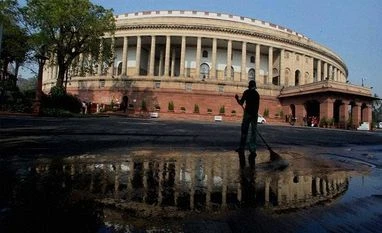The Lok Sabha on Friday took up for debate the no-trust vote against the Narendra Modi government, the first since the BJP-led dispensation came to power four years ago.
Telugu Desam Party's Jayadev Galla initiated the discussion on the no-confidence motion.
Opposition parties have brought the motion against the government on several issues like special status to Andhra Pradesh, cow vigilantism, lynchings, atrocities against women and Dalits and alleged dilution of the SC/ST Act.
Leader of the Congress in the Lok Sabha Mallikarjun Kharge accused Speaker Sumitra Mahajan of being unfair in allotting too little time to the opposition in the debate on the no-confidence motion and said the discussion cannot be treated as Question Hour.
The 32 minutes allotted to his party is grossly inadequate, Kharge said. A few minutes to each speaker is not enough to raise the host of issues, including those affecting farmers, women and Dalits, he added.
Some parties have been allotted 25 minutes and some just 15 minutes, Kharge pointed out. "....there is a problem of farmers, Dalit issues, women issues. Can these issues be explained in one minute. You need at least half an hour for each speaker. The biggest party is being allotted 32 minutes by the speaker and they say the allotment is as per rules," Kharge told reporters outside Parliament.
The speaker, he said, can bring an amendment in rules for allotment of more time.
"The debate on the no-confidence motion cannot be treated as Question Hour. Even small bills are allotted six-seven hours," the Congress leader said.
NDA to prove majority, Oppn to see strength of NDA plus: BJP
Union minister Ananth Kumar exuded confidence that the NDA would prove its majority in the Parliament and said the opposition would see the strength of "NDA plus" during the no-trust motion.
Kumar entered the parliament with BJP president Amit Shah and both leaders flashed the victory sign.
The Narendra Modi government is expected to have a smooth sailing when it faces the first no-confidence motion in four years in the Lok Sabha.
Though the numbers are heavily stacked against the opposition, the Congress and other parties have indicated that they are keen to utilise the debate to attack the government on a range of issues including farm distress, slow economic growth and rising incidents of lynching.
Ahead of Assembly polls in four states due later this year and the 2019 Lok Sabha elections, BJP leaders see the debate as an opportunity to reach out to the masses with "successes" of the government and also to attack the "opportunist alliance" of opposition parties.
The Congress and other parties have indicated that they are keen to utilise the debate to attack the government on a range of of issues, including farm distress, slow economic growth and the rising incidents of lynching.
In a House of 535 members, the ruling National Democratic Alliance has 313 members in the Lok Sabha, including 274 (including the Speaker) of BJP, 18 of Shiv Sena, six LJP and four SAD.
The stated strength of the Opposition is 222, including 63 of the Congress-led UPA, 37 of AIADMK, 34 of TMC, 20 BJD, 16 TDP and 11 TRS.
The majority mark in the House is 268. There are 11 vacancies.
The opposition move for a no-confidence motion was not allowed in the last Budget Session that was washed out due to a continued uproar by TDP, TRS and some other parties demanding that government agree to the motion.
The Speaker had then disallowed them on the ground that the House was not in order as there were continuous uproar and protests in the Well by members on various issues.
Unlock 30+ premium stories daily hand-picked by our editors, across devices on browser and app.
Pick your 5 favourite companies, get a daily email with all news updates on them.
Full access to our intuitive epaper - clip, save, share articles from any device; newspaper archives from 2006.
Preferential invites to Business Standard events.
Curated newsletters on markets, personal finance, policy & politics, start-ups, technology, and more.
)